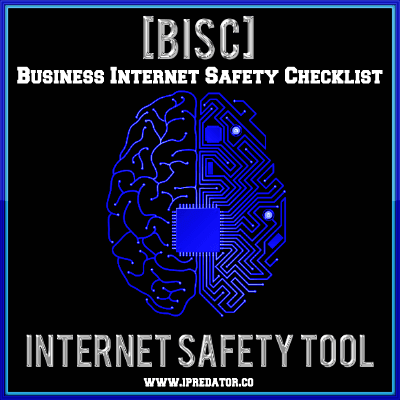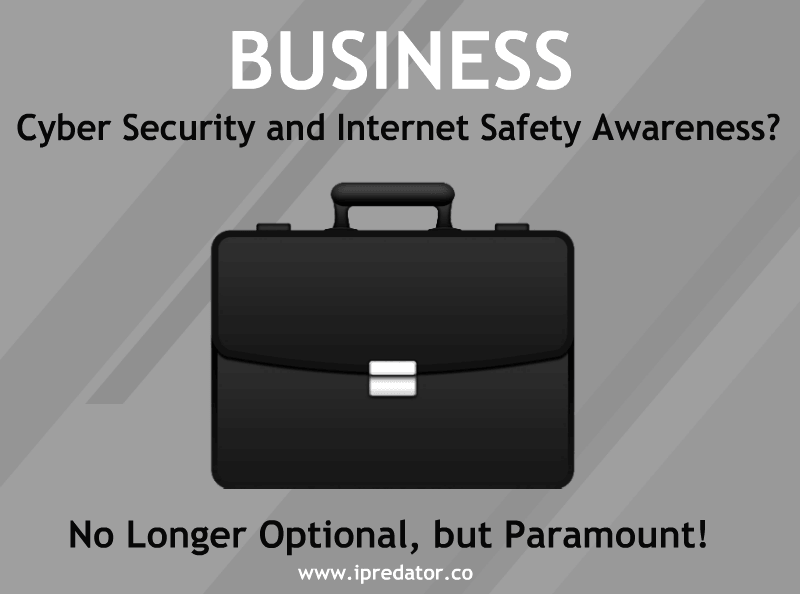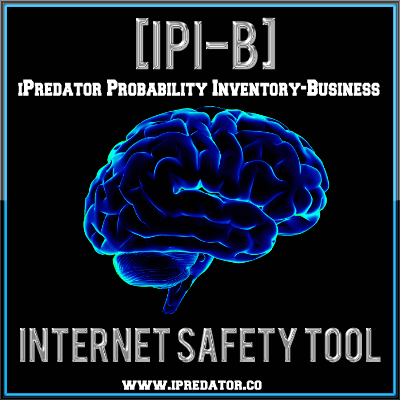20 Cyber Security and Internet Safety Tips
for
Business
Cyber Security Business Tips: Below are 20 internet safety and cyber security tips that are included in the Business ICT Safety Checklist (BISC) offered for free here at this site. Given the growth of information technology, E-commerce, M-commerce and the importance of digital reputation to a growing number of organizations, all organizations must now allocate a portion of their operating budget and energy to insulate their businesses from cybercrime, hacking, fraud, identity theft, disgruntled past employees and nefarious corporate competitors.
If it is not already being done within your business, it is highly recommended to address your organizational weaknesses in relationship to a cyber-attack, employee social media usage and the growing concern of a security breach by iPredators. Also important, and briefly detailed below, is an overview of the nefarious and malevolent elements that exist in cyberspace.
The twenty tips provided can be a first step in your endeavor to establish a secure organization related to Information and Communications Technology (ICT) and the human factors rarely addressed in the Information Age. Although cybercrime, identity theft, cyber theft and online corporate disparagement require ICT usage, it is vital to always address the issues involving the people related to the business who use electronic devices to conduct your business.
Cybercrime Prevention Requires
Active Cyber Security
ICT: Information and Communications Technology (ICT) is an umbrella term used to define any electronic or digital communication device or application used to obtain, exchange or disseminate information. ICT stresses the role of unified communications and the integration of telecommunications, which enable users to create, access, store, transmit, and manipulate information.
ICT consists of all forms of telecommunication, information technology, broadcast media, audio and video processing, transmission and network-based control and monitoring functions. Information and Communications Technology means computer-based management of data or ideas but will continue to grow with technological advancements. ICT has rapidly become one of the basic building blocks of modern society and will become increasingly integral as the information age matures.
Many countries now regard understanding ICT and mastering the basic skills and concepts of ICT as part of the core of education, alongside reading, writing and mathematics. The importance of ICT to humanity lies upon a continuum of relevance ranging from minimal impact to vital requirement regarding an ICT user’s day-to-day activities. For some, ICT and the Internet are nothing more than tools of convenience for conducting their responsibilities. For others, their social, scholastic, business and/or financial affairs disclosed online are crucial to their self-esteem, self-worth, success and perceptual world.
As Information and Communications Technology (ICT) becomes more widespread, cyber-attack prevention, education and protection are areas requiring immediate attention. The Information Age has many benefits to humanity, but it is vital to identify and prevent the malevolent and nefarious elements that exist in cyberspace and Information and Communications Technology.
Note: The term “business” in the tips below represents any of the following: owner(s), employees, business consultants or the business itself as an entity.
1. The business is ICT safe from hackers and checked regularly for updates.
2. The business is ICT safe from viruses and checked regularly for updates.
3. The business is ICT safe from malware and checked regularly for updates.
4. The business is ICT safe from a mobile device cyber-security breach and checked regularly for updates.
5. The business has a formal written Internet security policy.
6. The business engages in Internet safety training.
7. The business’s ICT has automatic software and security updates.
8. The business inspects sensitive online information and what is needed to protect it.
9. The business protects sensitive company data on all mobile devices.
10. The business monitors how employees interact with social media.
11. The business checks for new cybercrime protection products and services.
12. The business monitors sensitive online information and knows the value to a cyber criminal.
13. The business knows the consequences of using the Internet in an unsafe manner.
14. The business tracks social networking sites employees visit during downtime at the job location.
15. The business is educated on safe online practices.
16. The business diversifies the ICT passwords.
17. The business knows the latest cyber threats and how to combat them.
18. The business is safe from a loss of data.
19. The business is safe from customer and financial information theft.
20. The business is safe from loss of employee or financial data.

Business Internet Safety Checklist
[BISC]
(click text for free assessment page download)
Business Internet Safety Checklist [BISC]: The Business Internet Safety Checklist [BISC] is a 100-item checklist designed for a business to verify, upgrade or monitor their Information and Communications Technology [ICT] safety and security practices. The BISC is a data collection tool that investigates a business’s vulnerability of being targeted, disparaged, slandered, stolen from or infiltrated by cyber criminals, disgruntled past employees/customers or nefarious corporate competitors. Related to cybercrime specific areas, the BISC focuses the business on their cyber-security breach potential, digital reputation acumen and capacity to institute internet safety and cyber security strategies. The BISC is designed for using on a regular basis as part of a business’s internet safety and cyber security monitoring practices.
iPredator Probability Inventory-Business
[IPI-B]
(click text for free assessment page download)
iPredator Probability Inventory-Business [IPI-B]: The iPredator Probability Inventory-Business is a 110 questions diagnostic, education, assessment and data collection tool designed to assess a business’s vulnerability of being targeted, disparaged, slandered, stolen from or infiltrated by online assailants or nefarious corporate competitors. Related to cybercrime specific areas, the IPI-B also assesses a business’s cyber-security breach potential, digital reputation acumen and capacity to institute internet safety and cyber security strategies. A business owner, employee or consultant familiar with the business’s Information and Communications Technology [ICT] health and safety completes the IPI-B. The IPI-B is designed for using on a regular basis as part of a business’s internet safety and cyber security inquiries.

Michael Nuccitelli, Psy.D.
Michael Nuccitelli, Psy.D. is a NYS licensed psychologist, cyberpsychology researcher and online safety educator. In 2009, Dr. Nuccitelli finalized his dark side of cyberspace concept called iPredator. Since 2010, he has advised those seeking information about cyberbullying, cyberstalking, cybercriminal minds, internet addiction and his Dark Psychology concept. By day Dr. Nuccitelli is a practicing psychologist, clinical supervisor and owner of MN Psychological Services, PLLC. After work and on the weekends, he volunteers helping online users who have been cyber-attacked. Dr. Nuccitelli’s is always available to interested parties and the media at no cost. This website and everything created by Dr. Nuccitelli is educational, free and public domain.

